Related Research Articles

Bruce Frederick Joseph Springsteen is an American rock singer, songwriter and guitarist. Nicknamed "the Boss", he has released 21 studio albums during a career spanning six decades, most of which feature his backing band, the E Street Band. Springsteen is a pioneer of heartland rock, a genre combining mainstream rock music with poetic and socially conscious lyrics that feature narratives primarily concerning working-class American life. He is known for his descriptive lyrics and energetic concerts, with performances that can last for more than four hours.
Born in the U.S.A. is the seventh studio album by the American singer-songwriter Bruce Springsteen, released on June 4, 1984, by Columbia Records. The album was recorded with the E Street Band and producers Chuck Plotkin and Jon Landau over the course of several years, while Springsteen was also working on his previously released album, Nebraska (1982). It features tighter songs with a brighter, more pop-influenced sound than Springsteen's previous albums, and prominent synthesizer, while its lyrics explore themes of working-class struggles, disillusionment, patriotism, and personal relationships. The cover features a photograph of Springsteen from behind, taken by Annie Leibovitz; it has since become one of the musician’s most iconic images.
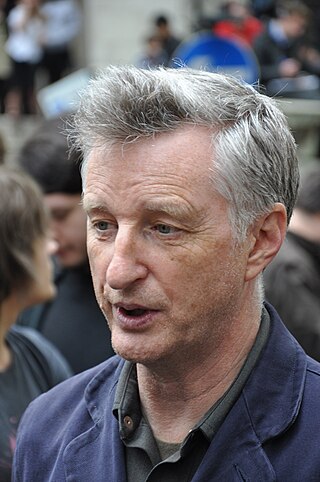
Stephen William Bragg is an English singer, songwriter, musician, author and political activist. His music blends elements of folk music, punk rock and protest songs, with lyrics that mostly span political or romantic themes. His activism is centred on social change and left-wing political causes.

Nebraska is the sixth studio album by the American singer-songwriter Bruce Springsteen, released on September 30, 1982, by Columbia Records. Springsteen recorded the songs as demos on a 4-track recorder, intending to rerecord them with the E Street Band, but decided to release them as they were. Nebraska remains one of the most highly regarded albums in his catalogue, and was ranked number 150 in Rolling Stone's 2020 edition of its "The 500 Greatest Albums of All Time" list.

Joe Hill, born Joel Emmanuel Hägglund and also known as Joseph Hillström, was a Swedish-American labor activist, songwriter, and member of the Industrial Workers of the World. A native Swedish speaker, he learned English during the early 1900s, while working various jobs from New York to San Francisco. Hill, an immigrant worker frequently facing unemployment and underemployment, became a popular songwriter and cartoonist for the union. His songs include "The Preacher and the Slave", "The Tramp", "There Is Power in a Union", "The Rebel Girl", and "Casey Jones—the Union Scab", which express the harsh and combative life of itinerant workers, and call for workers to organize their efforts to improve working conditions.

Dion Francis DiMucci, better known mononymously as Dion, is an American singer and songwriter. His music incorporates elements of doo-wop, pop, rock, R&B, folk and blues. Initially the lead singer of the vocal group Dion and the Belmonts, Dion embarked on a solo career, and was one of the most prominent rock and roll performers of the pre-British Invasion era. He had 39 Top 40 hits in the late 1950s and early 1960s as a solo performer, or with the Belmonts and the Del-Satins. He is best remembered for his signature hit songs "Runaround Sue", "The Wanderer", "Ruby Baby" and "Lovers Who Wander", among others.

Jamie Cullum is an English jazz-pop singer, songwriter and radio presenter. Although primarily a vocalist and pianist, he also accompanies himself on other instruments, including guitar and drums. He has recorded nine studio albums, three compilation albums, one live album and twenty-four singles. Since April 2010, he has presented a weekly Tuesday evening jazz show on BBC Radio 2.

England, Half-English is a 2002 album by English political singer-songwriter Billy Bragg and the Blokes, and a song from that album. The song is about racism in England and the anti-immigration feelings and racist abuse of asylum seekers fuelled by the tabloid press, particularly the Daily Mail. The song uses examples such as the lions on the English football team's shirts, Britannia and the English patron saint, St. George, the hyphen in Anglo-Saxon and the nation's favourite dish (curry) to convey his message that everything about English culture is shaped and influenced by the waves of immigration that have taken place in the past.
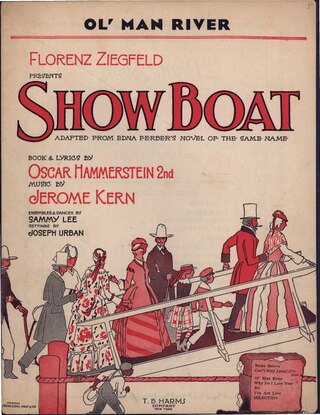
"Ol' Man River" is a show tune from the 1927 musical Show Boat with music by Jerome Kern and lyrics by Oscar Hammerstein II, who wrote the song in 1925. The song contrasts the struggles and hardships of African Americans with the endless, uncaring flow of the Mississippi River. It is sung from the point of view of a black stevedore on a showboat, and is the most famous song from the show. The song is meant to be performed in a slow tempo; it is sung complete once in the musical's lengthy first scene by the stevedore "Joe" who travels with the boat, and, in the stage version, is heard four more times in brief reprises. Joe serves as a sort of musical one-man Greek chorus, and the song, when reprised, comments on the action, as if saying, "This has happened, but the river keeps rolling on anyway."

The Internationale is a 1990 album by Billy Bragg. Originally released on Bragg's short-lived record label, Utility Records, it is a deliberately political album, consisting mainly of cover versions and rewrites of left-wing protest songs. Although Bragg is known for his association with left-wing causes, this release is unusual; most of Bragg's recordings balance overtly political songs with social observation and love songs.
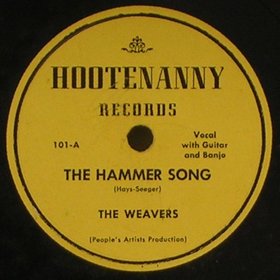
"If I Had a Hammer " is a protest song written by Pete Seeger and Lee Hays. It was written in 1949 in support of the Progressive movement, and was first recorded by the Weavers, a folk music quartet composed of Seeger, Hays, Ronnie Gilbert, and Fred Hellerman. It was a #10 hit for Peter, Paul and Mary in 1962 and then went to #3 a year later when recorded by Trini Lopez in 1963.

Life's a Riot with Spy vs Spy is Billy Bragg's first album, released in 1983. All songs on the original album consisted of Bragg singing to his electric guitar accompaniment.

Joseph Leonard Bonamassa is an American blues rock guitarist, singer and songwriter. He started his career at age twelve, when he opened for B.B. King. Since 2000, Bonamassa has released fifteen solo albums through his independent record label J&R Adventures, of which eleven have reached No. 1 on the Billboard Blues chart.
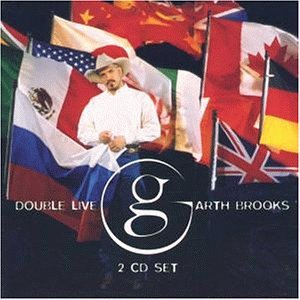
Double Live is the first live album by American country music singer Garth Brooks. It was released on November 17, 1998, and is a two-disc compilation of live songs, recorded during Brooks's 1996–98 world tour.
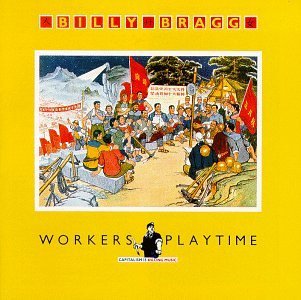
Workers Playtime is a 1988 album by Billy Bragg. Originally released on the Go! Discs label, it is his fourth release but third full-length album. It was reissued on compact disc in September 1996 on the Cooking Vinyl label before being remastered, expanded and reissued in 2006 on Cooking Vinyl in the UK and on the Yep Roc label in the United States.
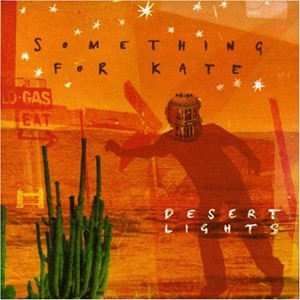
Desert Lights is the fifth studio album by Australian band, Something for Kate, released on 1 June 2006. It peaked at No. 1 on the ARIA Charts – their second studio album to do so after The Official Fiction. Desert Lights was accredited gold by ARIA for shipment of 35,000 copies by the end of 2006.

"I'm Goin' Down" is a rock song written and performed by American singer-songwriter Bruce Springsteen. It was released on August 27, 1985 by Columbia Records as the sixth single from his 1984 album Born in the U.S.A. The song was recorded with the E Street Band in May 1982 at Power Station studio in New York City, and co-produced by Springsteen, Jon Landau, Chuck Plotkin, and Steve Van Zandt. Although Springsteen had changing ideas about the songs to put on the album, "I'm Goin' Down" was ultimately selected for inclusion.
The Woody Guthrie Foundation, founded in 1972, is a non-profit organization which formerly served as administrator and caretaker of the Woody Guthrie Archives. The Foundation was originally based in Brooklyn, New York and directed by Woody Guthrie's daughter Nora Guthrie.

Mr Love & Justice is the twelfth studio album by folk-rock musician Billy Bragg, and the second to be recorded with his backing band The Blokes. The title is taken from the 1960 novel by Colin MacInnes.
"There Is Power in a Union" is a song written by Billy Bragg and first released on his 1986 Talking with the Taxman About Poetry album. It is set to the tune of George Frederick Root's "Battle Cry of Freedom".
References
- ↑ Adler, William M. (2011). The Man Who Never Died: The Life, Times, and Legacy of Joe Hill, American Labor Icon. Bloomsbury Publishing USA. ISBN 978-1-60819-285-4.
- ↑ Mitgang, Herbert (1985-08-15). "ALFRED HAYES, 74, A NOVELIST, POET AND SCREENPLAY WRITER". The New York Times. ISSN 0362-4331 . Retrieved 2023-06-03.
- ↑ "Joe Hill". Song of America. Archived from the original on 26 July 2021. Retrieved 19 November 2021.
- ↑ Weaver, Matthew; Arnett, George (21 November 2014). "Will Theresa May toe party line on Desert Island Discs?". The Guardian . Archived from the original on 26 May 2021. Retrieved 19 November 2021.
- ↑ Billboard. Nielsen Business Media, Inc. 27 March 1943. Archived from the original on 7 April 2023. Retrieved 7 April 2023.
- ↑ Bledsoe, Wayne (16 March 2017). "Shelby Bottom keeps the Joe Hill story alive". Knoxville News Sentinel. Archived from the original on 1 March 2021. Retrieved 19 November 2021.
- ↑ "One Day at a Time". AllMusic. Archived from the original on 19 November 2021. Retrieved 19 November 2021.
- ↑ Daly, Sean (1 May 2014). "Review: Bruce Springsteen still rocking for all he's worth at 64". Tampa: Tampa Bay Times. Archived from the original on 5 July 2014. Retrieved 19 November 2021.
- ↑ Billy Bragg - The Internationale Album Reviews, Songs & More | AllMusic , retrieved 2023-06-03